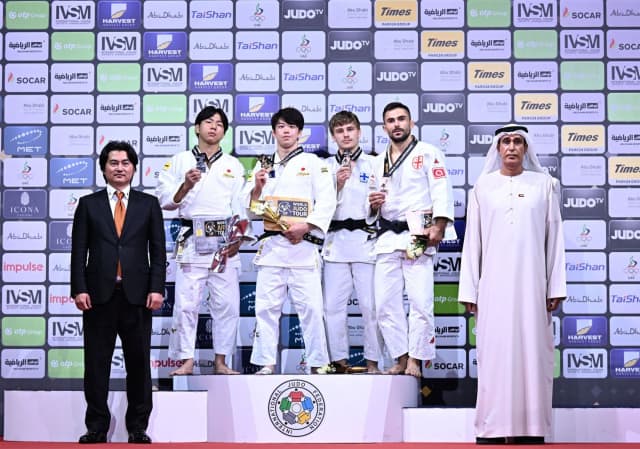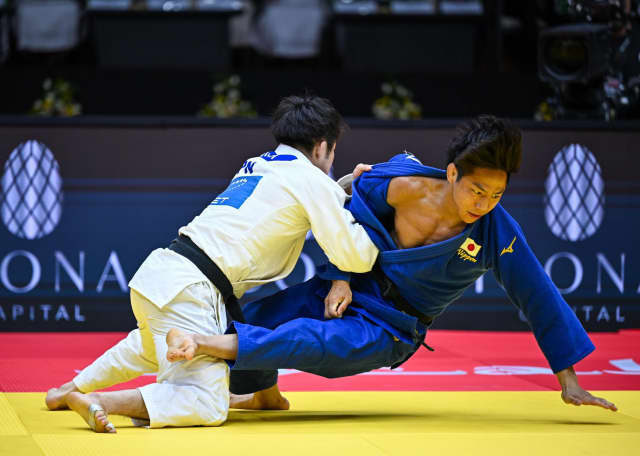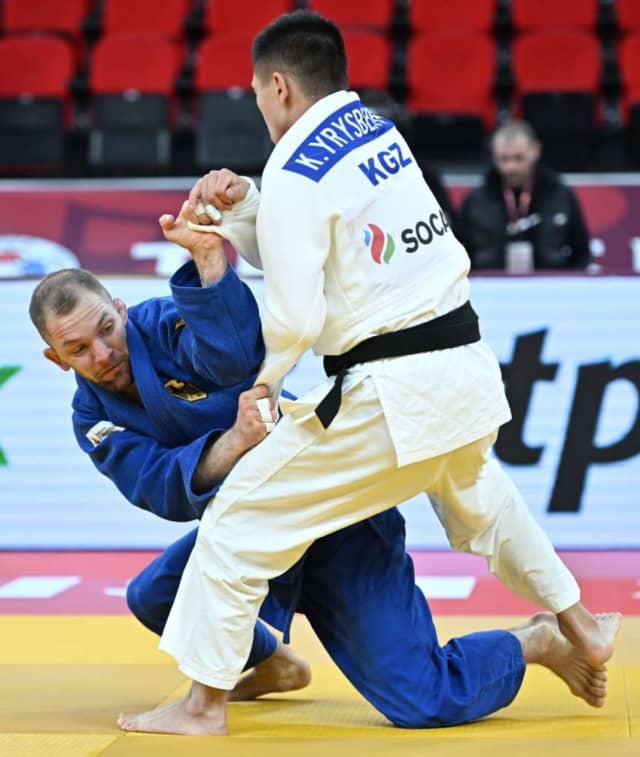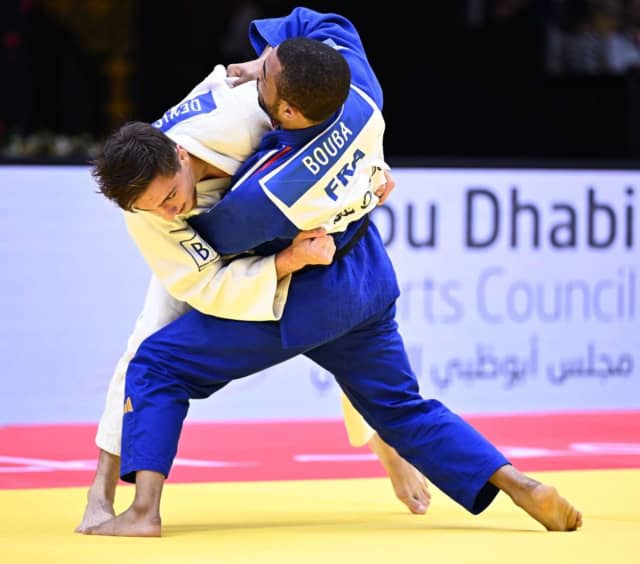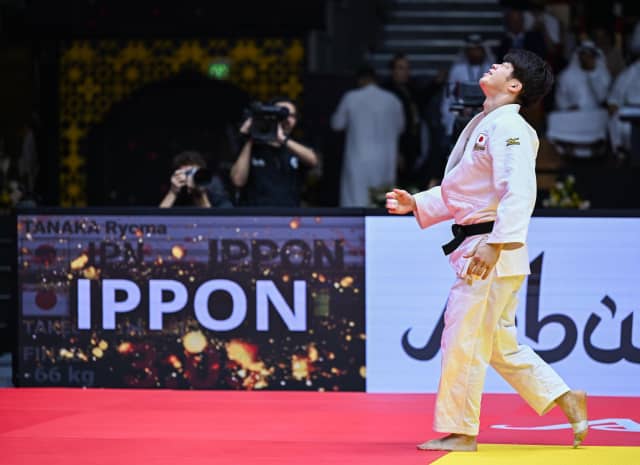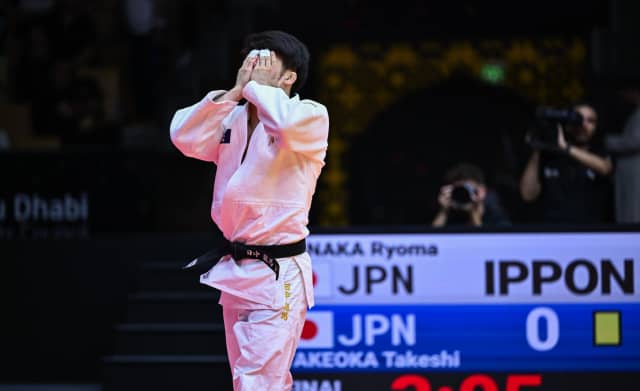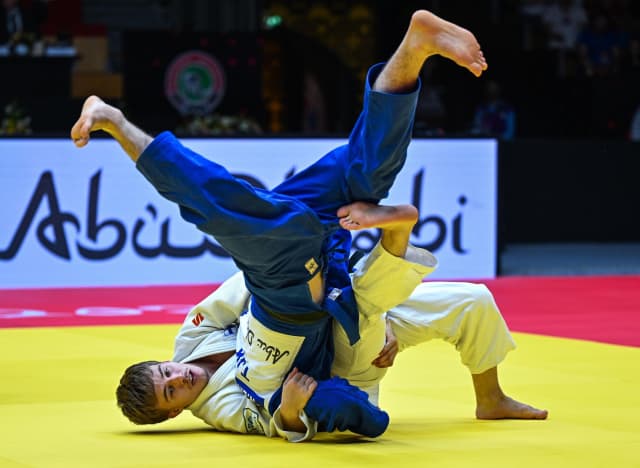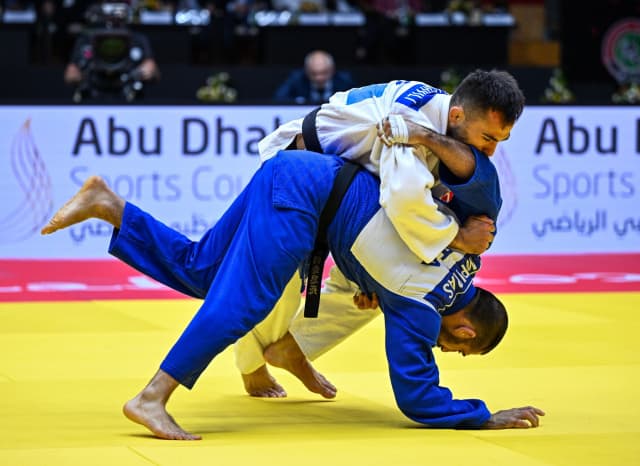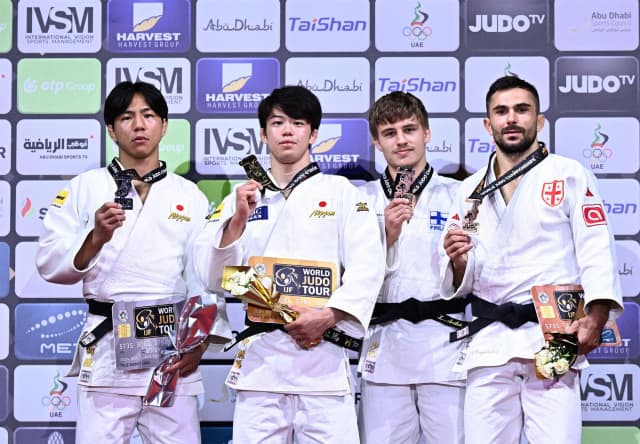Despite the demonstrably unpredictable nature of the category in general, the Japanese legends Hifumi Abe and Joshiro Maruyama have squared off with each other in each of the last six world championship finals but neither were present in Abu Dhabi this time, giving hope to the rest of the field that Japan’s winning streak would finally be broken.
The country’s two entrants, Ryoma Tanaka and Takeshi Takeoka, had other ideas. Though neither are as established as Abe and Maruyama, both have shown themselves to be just more than capable, the former having won the Hungary Masters 2023 and the latter having taken gold at the Paris Grand Slam 2024, and sure enough, they carved a path to meet in the final, defeating four of the remaining five seeded players between them.
Tanaka started his day in pool B, first defeating Martin Setz (GER) in round 1 with a powerful sode-tsurikomi-goshi attack after only a minute of the contest. A waza-ari scored using seoi-nage inside the last minute of his round 2 contest against Tal Flicker (ISR) was enough to see him through to face fourth seed Willian Lima in round 3. This time Tanaka was unable to throw his opponent, so instead took a tactical victory over the Brazilian, who picked up his third and final penalty two minutes into golden score.
Tanaka was due to face An (KOR) in the quarter-final, but following his victory over Holoborodko (UKR) in round 3, the Korean was unfortunately unable to continue due to injury. As a result, the Japanese athlete progressed to the semi-final.
His opponent would be the winner of pool A, and with the two seeded players in the pool exiting the tournament early, the two athletes in the pool who had the most to lose, those with the most to gain took full advantage. Luukas Saha (FIN) started the day nearly 600 ranking points shy of qualification for the Paris 2024 Olympic Games, while Matteo Piras (ITA) was looking to maintain his lead over compatriot Elios Manzi in their internal race for qualification.
Saha carried over his bronze-medal-winning form from the Dushanbe Grand Slam two weeks ago, defeating Moudetere (ZAM), Gerchev (BUL) and Bouba (FRA) in the opening rounds. Meanwhile, Piras overcame the 2021 world champion at -60kg Yago Abuladze and double grand prix winner Mukhriddin Tilovov (UZB). After Manzi’s defeat to the third seed Baskhuu Yondonperenlei in round 2, Piras battled to defeat Dzhebov in golden score to meet Saha in the quarter-final. There, a slick counter earned a waza-ari for Piras within 40 seconds and an unfortunate head dive and disqualification from Saha while attempting sode-tsurikomi-goshi sealed the victory for the Italian.
Piras’ renewed spirit was dampened in the semi-final against Tanaka, as the young Japanese judoka scored waza-ari in the first minute of golden score using ko-uchi-gari to book a place in the final.
Takeoka’s path to the final was not quite so smooth but was no less impressive. In his first two contests, he defeated Polanco (CUB) and Izvoreanu (MDA) by waza-ari, the latter in golden score. In round 3, he endured an exhausting 10 minute contest against Yondonperenlei, which ended with a third shido for the Mongolian for passivity.
In the quarter-final Takeoka came up against Olympic and double world medallist Vazha Margvelashvili (GEO). Clearly keen to avoid another long contest, he threw the Georgian for ippon in just 35 seconds with a well-timed ko-soto-gake. The seventh seed and former junior world champion Nurali Emomali (TJK) was the last person standing in Takeoka’s way in the preliminaries, and another huge ko-soto-gake with 30 seconds remaining flattened the Tajik judoka and ensured the -66 kg world title would return to Japan once more.
Unlike the long, epic battles we are used to in the -66kg world final, this one lasted less than a minute. Tanaka threw Takeoka twice, first with a clever uki-otoshi counter and later with a low, driving o-uchi-gari to score waza-ari-awasete-ippon and become the new world champion at just 22 years of age. Though Abe and Maruyama’s careers are far from over, Japan may have already found their successors.
Saha took on Emomali for the first of the bronze medals. This contest too was over in a flash; Saha applied hara-zutsumi to turn and hold Emomali, scoring ippon in just over a minute. His world medal is only the second ever for Finland, after Juha Salonen’s bronze way back in 1981. This result means that he will now qualify directly for the Olympic Games, two phenomenal achievements at once for the 25-year-old.
Margvelashvili and Piras went head-to-head for the second bronze medal. Though the contest was much closer than the other medal matches, Margvelashvili came out on top, scoring ippon with less than 30 seconds remaining using sasae-tsurikomi-ashi to take his second world bronze medal. Piras can’t be too disappointed, as his fifth place ensures that he will be selected for his first Olympic Games at the age of 30.
